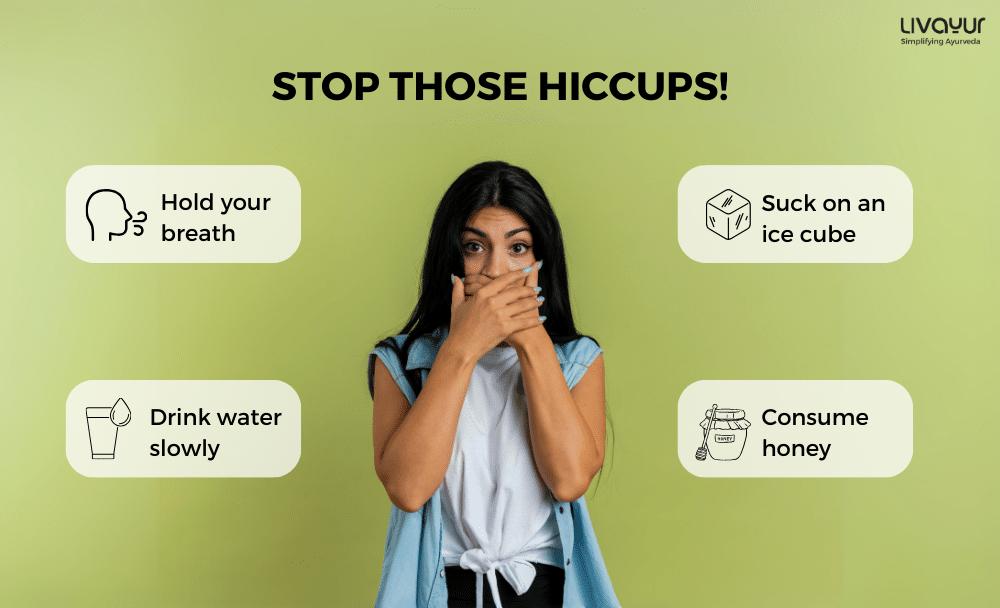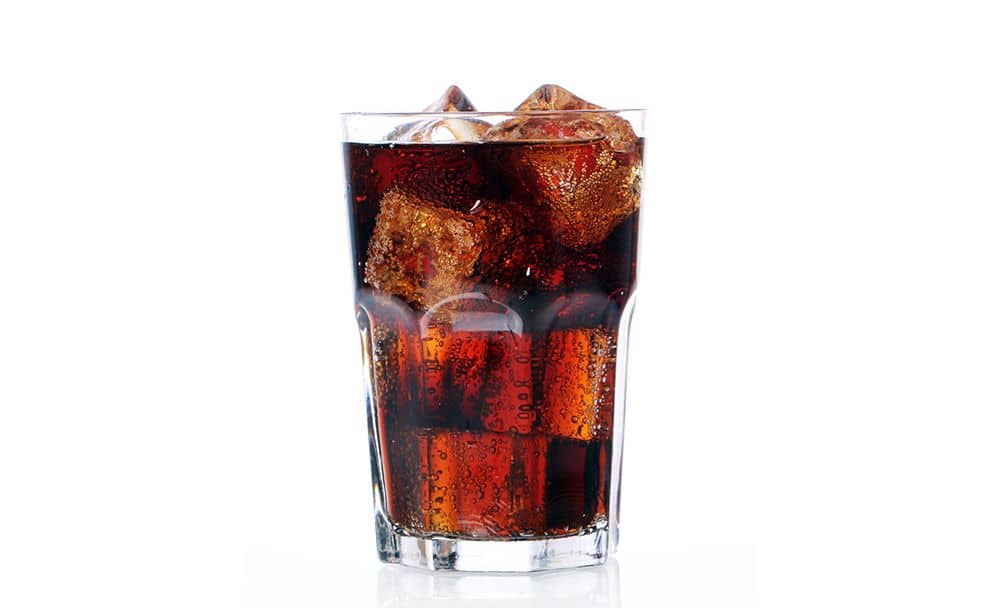
Hiccups, though often harmless and temporary, can be frustrating and disruptive. We’ve all experienced those awkward, unexpected interruptions to our conversations or moments of peace. If you’re tired of enduring these pesky spasms and seeking relief without medical intervention, you’re in the right place.
This article explores 12 effective home remedies that blend time-tested wisdom and modern science to help you eliminate those pesky hiccups. So, let’s look at how you can manage hiccups when they occur.
What are hiccups?
Hiccups, scientifically known as “singultus,” are involuntary contractions of the diaphragm muscle, followed by the abrupt closure of the vocal cords. These rapid and repetitive actions produce the familiar “hic” sound accompanying each spasm. Hiccups are common and can happen to anyone, regardless of age or gender.
While they might seem like a minor annoyance, hiccups can sometimes be triggered by various factors, such as consuming carbonated beverages and sudden changes in temperature. In most cases, hiccups are harmless and go away shortly. However, if hiccups persist for an extended period or become chronic, it might indicate an underlying medical condition requiring further attention.
Why do we get hiccups?
Though a common occurrence, hiccups can happen for the following reasons. [1]
- Unclear triggers
Hiccups can occur without reason, leaving us puzzled about their sudden onset.
- Stress and emotions
For some people, hiccups can be due to stress or strong emotions. These can include excitement or anxiety.
- Eating and drinking
Consuming large meals, carbonated beverages, or spicy foods may trigger hiccups in specific individuals.

Fortunately, most hiccups are transient and subside independently without any intervention. However, there are instances when hiccups persist for an unusually prolonged period, lasting more than 48 hours. It may also be an underlying medical condition. If you experience extended hiccups, seeking medical attention becomes essential to diagnose and address potential underlying issues.
How to stop hiccups: Twelve effective home remedies
Dealing with hiccups can be a bothersome experience. However, several effective home remedies can help you find relief. Let’s explore twelve time-tested techniques on how to stop hiccups instantly at home:
- Hold your breath
Take a deep breath and hold it for as long as you can. It helps regulate the diaphragm and often interrupts the hiccup cycle.
- Drink water slowly
Sipping water slowly and steadily can help relax the diaphragm and ease hiccups. Opt for room-temperature water, as cold or hot water might aggravate the condition.
- Swallow a teaspoon of sugar
The grainy texture of sugar can stimulate the vagus nerve, which is responsible for hiccup reflexes, and potentially stop hiccups.
- Pull your knees to your chest
Sit down and draw your knees to the chest, holding them in this position for a minute or two. It compresses the diaphragm and might bring relief.
- Try some honey
Consuming a spoonful of honey can help soothe the irritation in the diaphragm and halt hiccups.
- Breathe into a paper bag
Breathing into a paper bag increases carbon dioxide levels in the blood. It may help reset the diaphragm’s rhythmic contractions.
- Apply gentle pressure
Press gently on your diaphragm or abdomen to relieve spasms and potentially stop hiccups.
- Gargle with cold water
Gargling with cold water can stimulate the nerves at the back of your throat and interrupt the hiccup reflex.
- Use the “finger hold” technique
Apply pressure to the area just above your upper lip with your fingers, as this can activate the diaphragm and halt hiccups.
- Consume vinegar
Swallowing a teaspoon of vinegar (apple cider or white vinegar) might stimulate the vagus nerve and end hiccups.
- Suck on an ice cube
Sucking on an ice cube can help calm the diaphragm and curb hiccups effectively.
- Distract yourself
Engage in a distracting activity or focus on something unrelated to hiccups. Sometimes, redirecting your attention can stop the hiccup reflex.
What to avoid when you experience hiccups?
When those pesky hiccups strike, it’s essential to be mindful of certain habits and foods that can worsen or prolong the condition. Here are some things to avoid when you experience hiccups:
- Alcoholic, fizzy, or hot drinks
Avoid consuming alcoholic beverages, carbonated drinks, or hot beverages when you have hiccups. These drinks can irritate the diaphragm and trigger more hiccups.
- Chewing gum or smoking
Chewing gum and smoking can lead to swallowing excess air. It can aggravate hiccups. It’s best to steer clear of these habits until the hiccups subside.
- Spicy food
Spicy foods may irritate the stomach lining, potentially worsening hiccups or making them more uncomfortable.
- Eating too quickly
Rapidly eating large meals can contribute to hiccups. Slowing down and chewing your food thoroughly to avoid swallowing air is better.
- Temperature extremes
Avoid freezing foods or beverages immediately after something hot, as this contrast can stimulate the diaphragm and trigger hiccups.
When to consult a doctor?
Hiccups are typically harmless and transient, resolving on their own without the need for medical intervention. However, there are certain situations when seeking medical advice and evaluation is crucial. Here are the key points to consider when deciding to consult a doctor for hiccups:
- Hiccups last longer than 48 hours
If your hiccups persist for more than 48 hours, seeking medical attention is essential. Prolonged hiccups can indicate an underlying medical condition that requires investigation and treatment.
- Hiccups come back very often and are affecting your life
Consulting a doctor is suitable if you experience frequent bouts of hiccups that disrupt your daily activities, sleep, or overall quality of life. Chronic and recurrent hiccups may indicate an underlying issue you must address.
Ayurveda and hiccups
In Ayurveda, hiccups can be due to imbalances in the Doshas, which are the fundamental energies that govern the body. According to Ayurvedic principles, hiccups are due to the aggravation of the Vata dosha, which controls movement and communication in the body. Ayurvedic remedies for hiccups aim to restore balance and calm the Vata dosha.
These remedies often involve using natural herbs, spices, and breathing techniques to alleviate the hiccup reflex. Ayurveda’s holistic approach to hiccups considers the body’s physical and energetic aspects, making it a unique and potentially effective alternative for managing this common condition. As with any medical approach, it’s advisable to consult a qualified Ayurvedic practitioner to receive personalized hiccup guidance and treatment.
FAQs
1. How to stop hiccups instantly?
Stopping hiccups instantly can be challenging, but some techniques may provide quick relief. Try holding your breath for as long as you comfortably can or drink a glass of water in small sips without pausing for breath. Alternatively, you can try swallowing a teaspoon of sugar or breathing into a paper bag to increase carbon dioxide levels. Remember that what works for one person may not work for another. You may need to experiment with different methods to find what brings you instant relief.
2. How to stop hiccups immediately?
While stopping hiccups immediately is not always guaranteed, there are some methods you can try for instant relief. Holding your breath and drinking water in slow, continuous sips are commonly recommended techniques. Some people succeed by sucking on an ice cube or gargling with cold water. Keep in mind that individual responses may vary.
3. How to stop hiccups quickly?
To stop hiccups quickly, consider various remedies and see what works for you. Some quick options are holding your breath, drinking water, or consuming a spoonful of honey. Remember that the effectiveness of these methods may vary from person to person.
4. How to stop hiccups in adults immediately?
For adults experiencing hiccups, some immediate remedies may help. Attempt holding your breath for a short period or sipping water slowly. Swallowing a teaspoon of sugar or sucking on an ice cube can also provide relief. It’s essential to be patient, as what works instantly for one person may take a bit longer for another.
5. How to stop hiccups fast?
Consider a combination of remedies that suit you best to stop hiccups fast. Try holding your breath or drinking water in small sips. Swallowing sugar or honey, as well as sucking on an ice cube, are quick alternatives.
6. How to stop continuous hiccups?
Continuous hiccups can be bothersome. While instant relief might not always be achievable, there are strategies to alleviate them. Begin by holding your breath, sipping water, or consuming sugar or honey. Applying gentle pressure to your diaphragm or sucking on an ice cube may also provide relief.
Conclusion
Hiccups, though often harmless, can be annoying. Understanding the possible triggers can help manage and prevent hiccups more effectively. The twelve home remedies we’ve explored offer a diverse range of solutions. While these techniques have proven successful for many, it’s essential to remember that individual responses may vary.
If hiccups persist for an extended period, come back frequently, or impact your daily life, don’t hesitate to seek medical advice for a thorough evaluation. Remember, patience and perseverance are key. With the right approach, you can conquer hiccups and regain uninterrupted moments of comfort.
Disclaimer
The information provided here does not mean to replace professional advice or treatment.
References




















